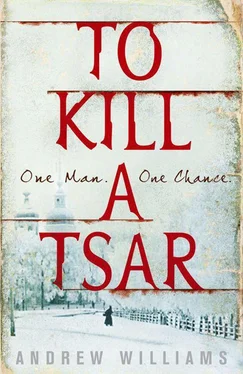‘I am not sure there is time for gradual change, sir.’ Hadfield’s voice was quiet, his words measured in the hope that a placatory tone would disguise the unbridgeable gap between them. ‘The educated read of what is happening in other countries — the freedom of the press, representation of the people — and they want the same basic rights here in Russia. ’
At the words ‘basic rights’ the general stiffened, his breathing became strained and he took on a dangerously high colour. It was perhaps fortunate for the state that he did not have a chance to press his nephew further. At the other end of the table his wife raised her hand.
‘I think we’ve heard quite enough politics,’ she said in English, as if to give a sharper edge to the steel in her voice.
There was no further talk of anarchy and the conversation settled into a comfortable drawing-room rut for the rest of the evening. A little before midnight Hadfield was able to excuse himself and retrieve his top hat and cloak from the sleepy Alexei. He stood on the pavement outside, breathing deeply to purge his mind and body of his uncle’s stale complacency. It was a clear night but warm for April with a promise of spring and the melting of the ice on the Neva. Across the river the lights were burning in the House of the Academics at the bottom of Line 7. The great Jakobi — a pioneer of electric motors and wire telegraphy — had lived and worked there, the botanist Famintsyn too, and it was still home to many of the university’s finest academics, a place where people strove to change the world for the better and celebrated progress in science and medicine — and politics too. As he began to walk back along the English Embankment, Hadfield could not help reflecting again that he was fortunate to live on the opposite bank. A good deal more than the width of the river seemed to separate the island from the embankment.
On the Nikolaevsky Bridge he was stopped by the same bored troop of gendarmes and obliged to present his passport again. This time his evening dress, top hat and cloak proved of more value than his papers in distinguishing him as a gentleman to be trusted. The gendarmes clearly believed a desperate revolutionary would never wear such finery.
It was some time before Hadfield could rouse the dvornik who serviced his rooms.
‘Did Your Honour forget his keys?’ he asked, swaying drunkenly on the doorstep. Hadfield slipped him a few kopeks.
‘Thank you, Your Honour. A boy delivered a letter for you this evening.’ He shuffled along the corridor to his room and came back clutching an envelope between grubby fingers.
Hadfield took the envelope and followed the dvornik up the stairs to his first-floor apartment. The small chandelier in the drawing room spluttered and a circle of light began to creep across the polished parquet and Astrakhan rugs. It was a sparsely furnished room — he had not had the time to purchase more — but there were a few fine English pieces from his uncle’s home: a bureau, a serpentine-fronted sideboard and a round mahogany dining table with brass feet. A dark oil of his father looking rather humourless hung over the fire, and to the right of the mantel a finer pastel of his mother as a young woman.
‘Can I do anything more for Your Honour?’
‘No. That’s all.’
Hadfield waited until he heard the heavy clunk of the apartment door and then, taking a paper knife from the bureau, he deftly slit the envelope open and took out a single small sheet. Written in a fine hand was the following:
Fontanka 86 on Sunday 8th April, 3.00 p.m. Come alone. Be careful.
Vera.
He folded it back into the envelope, opened a drawer and placed it inside. Then, taking a small brass key from his medical bag, he locked the front of the bureau.
So, Vera had returned to Petersburg.
The twisted mass of the body lay on the rug, head thrown back, mouth wide open. One knee was pulled up to his chest, the other bent awkwardly away, as if frozen in urgent movement. His hands were tied behind his back. The woollen threads of the rug were stained black and matted, and even by the light of the single candle Dobrshinsky could see the gaping wound at his throat.
‘Open the drapes,’ he said irritably.
One of the gendarmes stepped over to the window and dragged the heavy curtains back. The shabby little hotel room filled with sunlight and the comforting noise of life as it continued to be lived on the Nevsky Prospekt below. The ugly neck wound drew the eyes of all in the room. The throes of the dying man had forced the vicious cut open, peeling skin from his throat, exposing pink muscle and the cartilaginous rings of the windpipe.
‘His name is Bronstein. He was working for us,’ said the gendarme officer at Dobrshinsky’s elbow. Nothing in Major Vladimir Alexandrovich Barclay’s voice suggested he felt the slightest remorse or compassion for the dead man.
‘An informer?’ Dobrshinsky turned to look at Barclay.
‘Yes. A Hebrew.’ The major wrinkled his face in a show of contempt he expected all in the room to share. ‘We caught him agitating at a Moscow factory and he agreed to work for us rather than go to prison. Pity. He was useful.’
‘Who found the body?’
‘The hotel owner’s son.’
Four young men in their twenties — one of them Bronstein — had taken rooms in the Neva at the beginning of the week. Barclay knew from the informer that the leader of the group was a student called Popov, the son of a well-to-do civil servant; the other two were factory workers from Moscow. Bronstein had reported to his contact that Popov was to meet an important socialist to talk about the formation of a new party dedicated to terrorist action.
‘But as you see,’ said Barclay, ‘someone must have discovered he was working for us.’
Dobrshinsky stared at him, an intense appraising gaze that would have cowed many, but Barclay returned it without flinching. A competent officer, a man of careful method, Dobrshinsky thought, just the sort of fellow he could use. The Third Section was supposed to be an elite branch of the police, all-powerful, all-seeing, with special responsibility for suppressing political subversion in the empire. Its head was the Chief of the Corps of Gendarmes and he answered to the emperor in person. But the last incumbent had been stabbed to death in the street on the way to the section’s headquarters and his successor, General Drenteln, had only weeks before escaped the same fate by the skin of his teeth. If the section was unable to protect its own chief, Dobrshinsky thought, what hope for emperor and empire?
‘All right, shall we look at him, Major?’
There was a startled look on Bronstein’s thin white face, as if his death was impossible to imagine, his brown eyes wide, his mouth a little open. His goatee beard was thick with blood, and so were his trousers and peasant shirt.
‘There’s something attached to his chest,’ said Barclay, squatting beside the body. ‘A piece of card.’
He reached across to unpin it and was obliged to steady himself by placing a hand on the rug. ‘Damn it, I’ve got the Jew’s blood on me.’
He got to his feet and handed the card to Dobrshinsky. ‘In case there was any doubt…’
Written on the card in capitals was:
N.V. BRONSTEIN, TRAITOR, SPY, CONDEMNED AND EXECUTED BY RUSSIAN SOCIALIST REVOLUTIONARIES. THOSE WHO FOLLOW BRONSTEIN’S EXAMPLE WILL SHARE HIS FATE. DEATH TO ALL JUDAS BETRAYERS!
As he gazed into Bronstein’s dull eyes Dobrshinsky reflected that it was hard to feel sorry for a dead Judas, even if he was your own. He turned away to examine the room. It was small, just a single bed, three plain wooden chairs, a table covered in a grubby checked cloth and a large unvarnished wardrobe of pine. As Bronstein had thrashed despairingly for air he had speckled the furniture and walls with his blood. But the murderer had severed the windpipe, not the jugular, so there was less than might have been expected. Bronstein had almost certainly drowned in his own blood and he had been dead for at least twenty-four hours. One of the chairs lay on its side at the bottom of the bed and the sticky pool on the boards beside it suggested it was there the murderer had cut his victim’s throat.
Читать дальше












